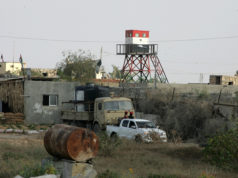Early Monday morning, Egypt’s top prosecutor, Hisham Barakat was killed in a bombing on his way to work. This comes after several years of escalating tensions between Islamists and the secular, military-backed government.
According to Egypt’s Health Ministry, a remote controlled bomb detonated in the wealthy Heliopolis neighborhood of suburban Cairo, wounding Barakat, 6 bodyguards, a driver, and 2 bystanders. The explosion incinerated Barakat’s car, and destroyed several surrounding cars, sending flying glass which injured many uninvolved persons. Although initial reports indicated that Barakat would survive his wounds, he eventually succumbed to his injuries.

An Egyptian policeman stands guard at the site of a bombing that killed Egypt’s top prosecutor, Hisham Barakat, in Cairo, Egypt, Monday, June 29, 2015. (Photo: AP) |
As Public Prosecutor, Barakat was responsible for referring thousands of Islamists for trial, and he had received death threats in the past.
Following the ousting of former President Mohamed Morsi, secular President Abdel Fattah el-Sisi has worked to suppress the Muslim Brotherhood and other political Islamists. The Muslim Brotherhood has engaged in retaliatory violence primarily in Egypt’s cities, while Islamist militant groups, comprised mainly of Bedouin tribesmen, are waging an insurgency against President Sisi primarily in the Sinai Peninsula. Insurgents have killed hundreds of Egyptian soldiers and security forces, and have recently expanded their focus outside of Sinai. Human Rights organizations claim that in pursuit of insurgents, President Sisi has jailed Islamists on invented, politically motivated charges. Barakat has led several cases against anti-government activists and members of the Muslim Brotherhood, which many outsiders claim to be politically motivated.
Although the violence has largely been contained in the Sinai, Egypt’s recent political instability has further intensified the frequency and scope of militant activity. Cairo-based judges and political figures have been targeted in attacks, and in 2013, Mohamed Ibrahim, Egypt’s Interior Minister at the time, survived a similar attack to the one that killed Barakat. The Egyptian military has responded with frequent incursions into Sinai, but have yet to defeat the insurgents, who are armed and supported by Iran.





